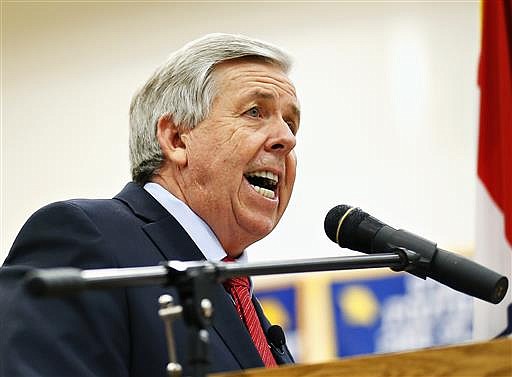Sen. Mike Parson on Thursday denounced violence against law enforcement and said he plans to work with other lawmakers to create legislative changes.
Across the nation, officers have been shot and killed after the Black Lives Matter movement reignited, including a St. Louis officer who was shot in the neck during a traffic stop and is now paralyzed from the neck down.
Parson, a former sheriff of Polk County in southwest Missouri who's running for the Republican nomination for lieutenant governor in the Aug. 2 primary, said the recent tragedies hit home. During his time as sheriff, two of his officers were shot, one of whom was killed, and his brother-in-law was killed in the line of duty as an EMT.
"I have never seen what I'm seeing in today's time, and I've never seen it especially in Missouri when it comes to the law enforcement issues," Parson said. "As you look around this country and this state and you see what's happening to law enforcement officers is unacceptable, and we've never been down this road before."
Parson said he plans to go back to the Capitol and meet with other senators about changing state statutes so that deliberate targets against law enforcement officers are classified as hate crimes.
He recalled being sheriff as the highlight of his professional career. If crimes against officers continue to unfold, it will deter more from entering the force, he said.
Cole County Sheriff Greg White was present and said it's harder to recruit officers now more than ever. During this time, officers may be reconsidering their careers and it's difficult to fill open positions.
He also said one of the hardest aspects of the job is maintaining a professional demeanor during "harsh" circumstances. The officers go through intensive training,l and most officers want to execute their jobs within the parameters of the law, he said.
"One gentlemen went through a shoot-don't-shoot curriculum, and he came out and said, 'I had no idea how much pressure you were under to make a split-second decision,'" White said. "There's a lot of time to look back on it and perceive what they think they would do. You're having to make split-second decisions, and it's very difficult."
He said the key to softening mistrust of police officers is developing relationships with the community. Officers don't always have a community tie to the area they're responding to, and it can be difficult to get past that, he said. But regardless, they have to go where they're called.
"There are divides racially in this nation; there are divides economically," he said. "To say there's not a divide would be ludicrous."
Parson said it's going to take the Black Lives Movement - and other organizations - working with the police to resolve the tension. Legislative actions can't fix the problem, but leaders federally, statewide and locally need to work together to figure out the best course of action, he said.
"Committing crimes isn't going to make things better," he added. "We're going to move backwards."
He said he takes issue with protesters committing crimes under the umbrella of the Black Lives Matter movement and other protesting organizations.
He said he doesn't blame the organization as a whole for the crimes that have been committed; he blames the people who use the organization as "a shelter to say, 'Hey, this is why I'm committing a crime.'"
"I'm talking about when people in Ferguson, Missouri, under the umbrella of an activist group throw urine on law enforcement officers," Parson said. "I think that's much more than speech. That's a commitment to doing something to me that's unlawful. I'm talking about spitting on people, someone sticks a camera in your face six inches away and you're trying to do your duty as a sworn-in officer."
If the violence doesn't end, Parson said, it will only deter more quality individuals from going into law enforcement and the public will suffer.
White said the sheriff's department has purchased body cameras for greater transparency and will implement them once they have all the proper technology.
The department is currently using dash cameras and cameras on tasers.
He said they almost never go to trial over the use of a taser because the footage is readily available. If the department found out an officer lied about an incident in his or her report, then the officer would be terminated.
During interactions with the public, White said, he tries to deal with everyone the way he would like to be treated.
"The key to all of this is content of character and human relations," he said.

